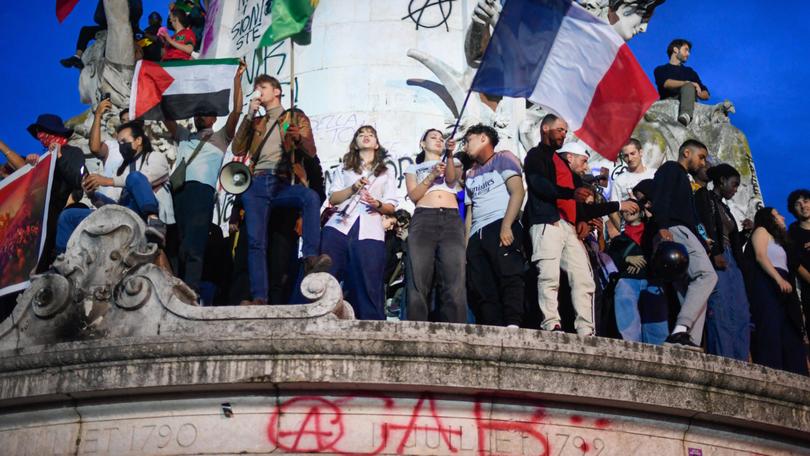New Popular Front: What to know about France’s leftist alliance after a shock election win
A leftist coalition in France has emerged as the surprising victor after the second and decisive round of voting in legislative elections Sunday. This is what that actually means.

A leftist coalition in France has emerged as the surprising victor after the second and decisive round of voting in legislative elections Sunday.
Projections show the newly formed New Popular Front finishing ahead of President Emmanuel Macron’s centrist coalition and Marine Le Pen’s far-right National Rally party.
The electoral triumph of the new alliance was a shock to many, after decades in which the French left has been defined by its deep divisions.
Sign up to The Nightly's newsletters.
Get the first look at the digital newspaper, curated daily stories and breaking headlines delivered to your inbox.
By continuing you agree to our Terms and Privacy Policy.But the strong performance by Le Pen’s anti-immigrant movement in the first round inspired the country’s various leftist forces to band together.
Here’s what to know.
An unlikely coalition
The New Popular Front was an 11th-hour alliance, born out of perceived necessity, bringing together two moderate left-wing parties - the centre-left Socialist Party and the Green Party - and two far-left movements - Jean-Luc Mélenchon’s France Unbowed and the Communist Party.
The alliance wants to lower the retirement age, which Macron raised last year, and vastly expand government spending on social welfare, environmental protection and health care.
Macron called snap elections last month after his coalition was trounced by the National Rally in European parliamentary elections, gambling that the possibility of a far-right government would push French voters to reaffirm his mandate.
While he appeared Sunday to have been correct about how the public would respond to the threat of the country’s first far-right government since World War II, he seemingly underestimated the appeal of the left.
In the first round, the New Popular Front came in second with 28 per cent of the vote, behind the 33 per cent of votes cast for National Rally. Macron’s centrist alliance secured only 21 percent.
French elections are decided at the district level, so while National Rally and the New Popular Front had more than 30 candidates each who won more than 50 per cent of the vote and were elected to Parliament outright, other districts went to a run-off between the top two or three candidates.
In districts where Le Pen’s candidates won a narrow victory, the leftist alliance and Macron’s centrist coalition combined efforts, encouraging weaker candidates to drop off the ballot. It was primarily candidates from the left, including Mélenchon’s France Unbowed, that renounced their second-round participation, according to France’s Le Monde newspaper.
Can the centre (left) hold?
While the New Popular Front has come out on top, they are nowhere close to securing a parliamentary majority. Unless moderate members of the alliance are able to form a government with Macron’s centrist allies, France could be headed for political gridlock with just weeks until Paris is set to host the Olympics.
After the first projections Sunday, Mélenchon, the most widely known figure in the alliance, called on Macron to invite the bloc to form a government.
“The president must bow and admit this defeat without trying to circumvent it,” Mélenchon said.
“No subterfuge, arrangement or combination would be acceptable” to keep his coalition from power, he added.
But even some within the leftist coalition view Mélenchon as too radical. Formed with the express intent of defeating Le Pen, it remains to be seen if its members can continue to paper over their differences and present a united front.
Even before the vote, on Thursday, François Ruffin, one of the most charismatic figures on the left, broke with Mélenchon, calling him an “obstacle,” and saying he would no longer align himself with the radical left in the National Assembly if re-elected.
Macron has said the far left is just as dangerous as the far right, particularly France Unbowed, and alleged last month that the alliance includes parties that propagate antisemitism. Some voters told The Washington Post in advance of the run-off that it was Macron’s alarmist rhetoric about the left that had rallied them to support the New Popular Front.
To form their alliance, leftist parties had to agree on one candidate per constituency.
To the frustration of the moderate left, which includes the Socialist Party that long shaped French politics, Mélenchon’s party obtained a particularly high share of candidates.
Rick Noack and Annabelle Timsit contributed to this report.
© 2024 , The Washington Post
